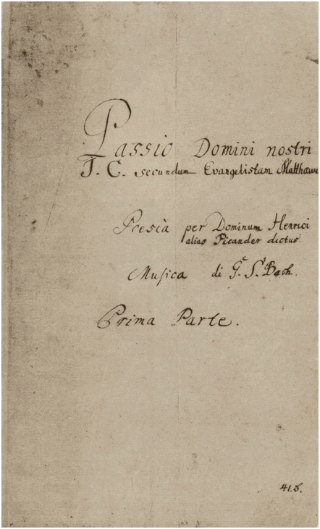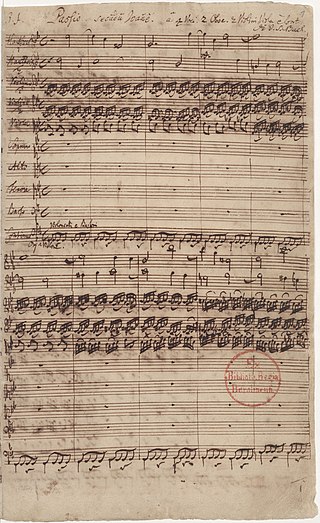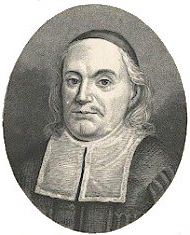
Heinrich Schütz was a German early Baroque composer and organist, generally regarded as the most important German composer before Johann Sebastian Bach and one of the most important composers of the 17th century. He is credited with bringing the Italian style to Germany and continuing its evolution from the Renaissance into the early Baroque. Most of his surviving music was written for the Lutheran church, primarily for the Electoral Chapel in Dresden. He wrote what is traditionally considered the first German opera, Dafne, performed at Torgau in 1627, the music of which has since been lost, along with nearly all of his ceremonial and theatrical scores. Schütz was a prolific composer, with more than 500 surviving works.

The St Matthew Passion, BWV 244, is a Passion, a sacred oratorio written by Johann Sebastian Bach in 1727 for solo voices, double choir and double orchestra, with libretto by Picander. It sets the 26th and 27th chapters of the Gospel of Matthew to music, with interspersed chorales and arias. It is widely regarded as one of the masterpieces of Baroque sacred music. The original Latin title Passio Domini nostri J.C. secundum Evangelistam Matthæum translates to "The Passion of our Lord Jesus Christ according to the Evangelist Matthew".

Sir Simon Russell Beale is an English actor. He has been described by The Independent as "the greatest stage actor of his generation". He has received two BAFTA Awards, three Olivier Awards, and a Tony Award. For his services to drama, he was knighted by Queen Elizabeth II in 2019.

Masaaki Suzuki is a Japanese organist, harpsichordist, conductor, and the founder and music director of the Bach Collegium Japan. With this ensemble he is recording the complete choral works of Johann Sebastian Bach for the Swedish label BIS Records, for which he is also recording Bach's concertos, orchestral suites, and solo works for harpsichord and organ. He is also an artist-in-residence at Yale University and the principal guest conductor of its Schola Cantorum, and has conducted orchestras and choruses around the world.

The Passio secundum Joannem or St John Passion, BWV 245, is a Passion or oratorio by Johann Sebastian Bach, the earliest of the surviving Passions by Bach. It was written during his first year as director of church music in Leipzig and was first performed on 7 April 1724, at Good Friday Vespers at the St. Nicholas Church.

"O Sacred Head, Now Wounded" is a Christian Passion hymn based on a Latin text written during the Middle Ages. Paul Gerhardt wrote a German version which is known by its incipit, "O Haupt voll Blut und Wunden".

Johann Sebastian Bach was a German composer and musician of the late Baroque period. He is known for his prolific authorship of music across a variety of instruments and forms, including orchestral music such as the Brandenburg Concertos; solo instrumental works such as the cello suites and sonatas and partitas for solo violin; keyboard works such as the Goldberg Variations and The Well-Tempered Clavier; organ works such as the Schubler Chorales and the Toccata and Fugue in D minor; and choral works such as the St Matthew Passion and the Mass in B minor. Since the 19th century Bach Revival, he has been generally regarded as one of the greatest composers in the history of Western music.
The St Mark Passion, BWV 247, is a lost Passion setting by Johann Sebastian Bach, first performed in Leipzig on Good Friday, 23 March 1731. Though Bach's music is lost, the libretto by Picander is still extant, and from this, the work can to some degree be reconstructed.
Johann Caspar Vogler was a German organist and composer taught by Johann Sebastian Bach.

St. Thomas School, Leipzig is a co-educational and public boarding school in Leipzig, Saxony, Germany. It was founded by the Augustinians in 1212 and is one of the oldest schools in the world.
Notable recordings of Johann Sebastian Bach's St Matthew Passion (Matthäus-Passion) are shown below in a sortable table.

The Evangelist in the music of Johann Sebastian Bach is the tenor part in his oratorios and Passions who narrates the exact words of one of the Four Evangelists of the Bible, translated by Martin Luther, in recitative secco. The part appears in the works St John Passion, St Matthew Passion, and the Christmas Oratorio, as well as the St Mark Passion and the Ascension OratorioLobet Gott in seinen Reichen, BWV 11. Some cantatas also contain recitatives of Bible quotations, assigned to the tenor voice.

Klagt, Kinder, klagt es aller Welt, also known as Köthener Trauermusik, BWV 1143, BWV 244a, is a cantata by Johann Sebastian Bach. He composed it in 1729 for the funeral of Leopold, Prince of Anhalt-Köthen. The music is lost, but the libretto survives. As Bach is known to have used musical material which also appeared in two surviving works, one being the St Matthew Passion, it has been possible to make reconstructions.
David Pohle was a German composer of the Baroque era. His surname is also spelled Pohl, Pohlen, Pole, Pol or Bohle.

Christian Weise, also known under the pseudonyms Siegmund Gleichviel, Orontes, Catharinus Civilis and Tarquinius Eatullus, was a German writer, dramatist, poet, pedagogue and librarian of the Baroque era. He produced a large number of dramatic works, noted for their social criticism and idiomatic style. In the 1670s he started a fashion for German "political novels". He has also been credited with the invention of the mathematical Euler diagram, though this is uncertain.

"O Lamm Gottes, unschuldig" is an early Lutheran hymn, with text and melody attributed to Nikolaus Decius. Originally intended as a German version of the Latin Agnus Dei, it was instead used as a Passion hymn. In both contexts, the hymn has often been set to music, prominently as the cantus firmus in the opening chorus of Bach's St. Matthew Passion. It is included in most German hymnals, and has been translated by Catherine Winkworth, among others.

"Ich hab in Gottes Herz und Sinn" is a Christian hymn with a text by Paul Gerhardt in twelve stanzas is sung to the melody of "Was mein Gott will, das g'scheh allzeit". The theme of the hymn is faith in God and the submission to his will.

"An Wasserflüssen Babylon" is a Lutheran hymn by Wolfgang Dachstein, which was first published in Strasbourg in 1525. The text of the hymn is a paraphrase of Psalm 137. Its singing tune, which is the best known part of the hymn and Dachstein's best known melody, was popularised as the chorale tune of Paul Gerhardt's 17th-century Passion hymn "Ein Lämmlein geht und trägt die Schuld". With this hymn text, Dachstein's tune is included in the Protestant hymnal Evangelisches Gesangbuch.

"Ein Lämmlein geht und trägt die Schuld" is a Lutheran Passion hymn in German by Paul Gerhardt. The hymn text was first published in Johann Crüger's Praxis Pietatis Melica, starting from the lost 1647 edition. Wolfgang Dachstein's 16th-century "An Wasserflüssen Babylon" melody is commonly indicated as its hymn tune, although other settings exist.














